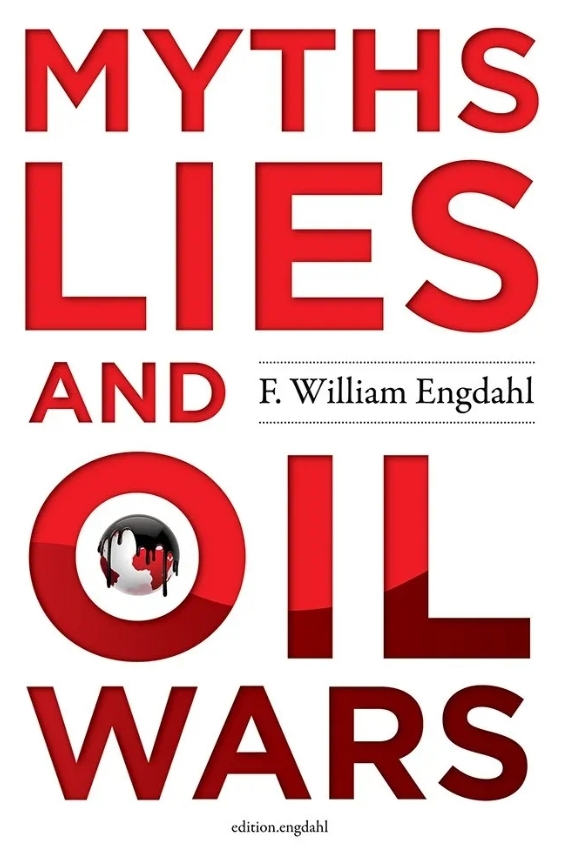Myths, Lies and Oil Wars by F. William Engdahl explores the geopolitical landscape surrounding oil, focusing on the myths and narratives that have shaped global policies and conflicts. Engdahl argues that a deeper understanding of the motivations behind oil wars reveals a complex interplay of economic interests, historical factors, and manipulative political strategies.
Key Themes and Concepts
- Historical Context of Oil Wars:
- Engdahl traces the historical significance of oil in global politics, starting from the early 20th century to the present. He emphasizes how the discovery of oil reserves has transformed international relations and led to conflicts, particularly in the Middle East.
- He explores the strategic importance of oil for both industrialized nations and emerging economies, highlighting how access to oil resources has been a driving force behind military interventions and foreign policies.
- The Role of Major Powers:
- The book discusses how major powers, particularly the United States and Britain, have historically manipulated global oil markets and politics to maintain control over resources.
- Engdahl argues that the U.S. has engaged in a series of wars and interventions under the pretext of spreading democracy or protecting human rights, but the underlying motive is often securing oil supplies.
- Myths and Misconceptions:
- Engdahl critiques several widely accepted narratives about oil wars, such as the belief that these conflicts are primarily about ensuring energy security or fighting terrorism.
- He argues that these myths serve to justify military actions and interventions, obscuring the true economic and geopolitical motivations behind them.
- The Petrodollar System:
- A significant portion of the book focuses on the “petrodollar” system, which refers to the practice of trading oil in U.S. dollars. Engdahl explains how this system has bolstered the U.S. economy and its global influence.
- He discusses the implications of the petrodollar system for international relations and how countries that challenge this system, like Iraq and Libya, have faced military interventions.
- Oil and Environmental Concerns:
- Engdahl addresses the environmental impact of oil extraction and consumption, arguing that wars for oil have devastating consequences not only for human lives but also for the planet.
- He critiques the disregard for environmental standards by oil companies and governments, linking these practices to broader issues of corporate greed and government complicity.
- Corporate Interests and Globalization:
- The book highlights the role of multinational corporations in perpetuating conflicts over oil. Engdahl argues that these corporations often drive foreign policy decisions and military actions to protect their interests.
- He discusses how globalization has facilitated the concentration of power in the hands of a few corporations, which can influence national policies and international relations.
- Case Studies of Oil Wars:
- Engdahl provides detailed case studies of specific conflicts, including the Gulf War, the Iraq War, and the interventions in Libya and Syria. He analyzes how oil interests shaped the decisions leading to these wars and their aftermath.
- Each case study illustrates the recurring patterns of deception and manipulation that Engdahl believes are characteristic of modern oil wars.
- Alternatives to Oil Dependency:
- Towards the end of the book, Engdahl discusses the need for a transition away from oil dependency, advocating for renewable energy sources and sustainable practices.
- He argues that breaking free from the current oil-driven geopolitical system is essential for achieving peace and stability in global relations.
Myths, Lies and Oil Wars provides a critical analysis of the relationship between oil and global politics. F. William Engdahl argues that understanding the historical and geopolitical dimensions of oil conflicts is crucial for debunking myths and uncovering the real motivations behind wars. Through a blend of historical research and political analysis, Engdahl calls for a reevaluation of the role of oil in international relations and advocates for a shift towards sustainable energy practices.
The book appeals to readers interested in geopolitics, energy policy, and the environmental implications of oil dependency. While Engdahl’s perspectives are sometimes controversial and provocative, his work encourages a deeper examination of the narratives surrounding oil wars and the forces that drive them.
In Myths, Lies and Oil Wars, F. William Engdahl presents a controversial theory about the origins of oil that challenges the widely accepted notion of fossil fuels being derived from decayed biological matter. He discusses the findings of scientists at the Santa Fe Institute and their research team in Ukraine, who explored the potential for oil reserves in regions where conventional geological theories suggested there was none.
Key Points on Abiotic Oil Theory
- Background of the Research:
- The research conducted by the Ukrainian team was focused on geological formations previously deemed unlikely to contain oil based on traditional theories that categorize oil as a fossil fuel, originating from decomposed organic materials over millions of years.
- The team’s exploration yielded significant discoveries of commercial oil and gas fields, contradicting the established view of oil generation.
- Abiotic Oil Theory:
- Engdahl explains the concept of abiotic or abiogenic oil, which posits that hydrocarbons can form from non-biological processes deep within the Earth’s crust. This theory suggests that oil is not a limited resource formed solely from ancient biological matter but can be generated through chemical processes involving carbon-bearing minerals.
- The term “abiogenic” is derived from the Latin prefix “a,” meaning “not,” indicating that the oil’s origin is not biological.
- Implications of the Findings:
- The discoveries made by the Ukrainian scientists challenge the mainstream understanding of oil formation and reserves, suggesting that oil might be more abundant and more widely distributed than previously thought.
- This perspective implies that many areas considered devoid of oil could potentially hold significant reserves, leading to a reevaluation of exploration practices and resource management.
- Critique of Conventional Oil Theory:
- Engdahl critiques the conventional fossil fuel theory, arguing that it limits exploration efforts and reinforces a narrative that oil is a finite resource. He asserts that this myth has significant geopolitical implications, contributing to wars and conflicts over oil resources.
- The abiotic theory offers an alternative viewpoint that may shift the focus of oil exploration and potentially alter global energy dynamics.
- Broader Context:
- Engdahl situates the discussion of abiotic oil within the larger narrative of oil wars and geopolitical strategies. He argues that the persistence of the fossil fuel theory serves the interests of powerful oil corporations and nations that benefit from the current energy paradigm.
- The notion that oil is not merely a relic of ancient life but a continually replenished resource challenges the arguments for oil scarcity, which are often used to justify military interventions and aggressive foreign policies.
In Myths, Lies and Oil Wars, F. William Engdahl introduces the abiotic oil theory as a significant and provocative counter-narrative to the conventional understanding of oil origins. The research conducted by the Ukrainian scientists at Santa Fe highlights the potential for substantial oil reserves in regions previously written off by traditional geological assessments. By challenging the fossil fuel paradigm, Engdahl opens a discussion on the implications for global energy policy, resource management, and the ongoing conflicts tied to oil. This theory invites readers to reconsider the foundational assumptions about energy resources and the geopolitical strategies that arise from them.








One Response
Love your articles!